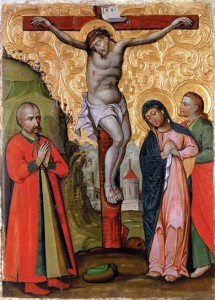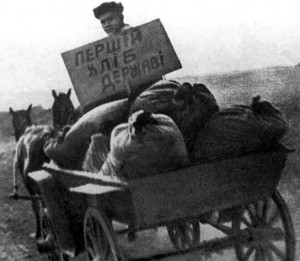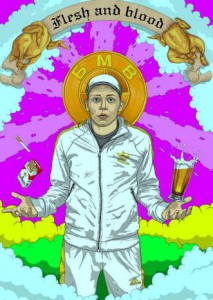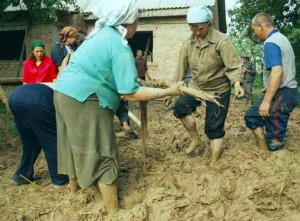The purpose of this article is to acquaint the Western reader with the Ethics of Ukraine in a concise and comprehensible way. Hereinafter Ethics will be understood as «Practical Philosophy», as a doctrine, which gives practical advice, regulates life.
Ethics, which was established in the Ukrainian lands after the Baptism of Rus’ (988) was Christian one. Life regulated by Biblical commandments. «Honor your father and mother», «Agree with thine adversary quickly, while thou art in the way with him», «Let no one seek his own, but each one his neighbor’s good», etc. All of these rules were really guide to action, not only declaration.
This fact has realised in traditional institutions, customs. For example, Toloka. Toloka is a free disposable teamwork. It’s a form of mutual aid when some one invites neighbors, relatives and friends to help him. It can be harvesting, building houses, joint grazing. Sometimes people could unite to build schools and churches.
They also were coming to the rescue when a man got problems with means of support. This help was provided on the third day of Christmas, Easter or on Sunday. In this regard, the neighbors said, «We have our guilt (because of work on a Holiday or Sunday), but Lord is merciful He’ll forgive us as we do that for love».
Work only for profit was not welcome. Work on Holidays considered like a sin. In the first place should be a spiritual life, man must to care about Heaven, not just of earth fuss.
In according to Christian Ethics, God helps the righteous and punishes the wicked. This point of view were expressed in greetings and proverbs. «God for help», «God, help» (greeting to a person who is busy working), «A man who despises his mom will be punished by God».
After the October Revolution (1917) Marxism became the official philosophy and even «religion» in the territory of Ukraine. Marxist Ethics insists a moral behavior depends from socio-economic circumstances in a rigid way. If appropriate conditions will be created, a person won’t need any reward or punish to provide his proper behavior. In particular, if abolition of private property and large-scale nationalization will be performed, the crime rate will drop. What reason to rob and steal, if all things are public and everyone can get as many goods as he needs from the public ownership? Under the such hypothesis they were creating collective farms («kolkhozes») instead of individual ones. The peasants were forced to give their property (livestock, agricultural implements) to the kolkhoz. This «collective property» belonged to the State. But, people did not stop stealing. Moreover, new problems arised. When people are herded into kolkhozes, they lose their sense of responsibility. The owner who can’t be indifferent to the farm disappeared.
«Moral Code of the Builder of Communism» (1961) requires «a honest work for the benefit of society, he who does not work he shall not eat», «to care about preservation and growth of the public domain».
Actual behavior rather was agreed with mocking slogan «Everything around belongs to kolkhoz, everything around belongs to me». It meant, that a theft is not shameful, because now they have everything in common. Discrepancy between the «official values» and real life was very dramatic.
After the collapse of the Soviet Union in the 90s the situation in the post-soviet area (including the independent Ukraine) became very specific. The crime rate has risen sharply. Racketeer and prostitute became the heroes of popular culture and even role models among young people.
Popular «moral trend» has been a life by «Concepts» (unwritten rules of the underworld) and related to them notions of good and evil. Here is an example. Everyone has a job. One is making a car. The other one should drive the car. Someone steals the cars. And everyone must do his job well.
Another new trend is the gradual spread of modern Western Moral Standards in Ukraine. In the professional fields it’s possible to meet «Corporate Credo», various Rules of Professional Conduct. Usually they are too «Western» and often do not correspond to Ukrainian situation. The local laws are such, that fair dealing becomes unprofitable. Many firms accept these rules of conduct, but the gap between declaration and reality is dramatic. People do not really follow ethic norms, which are replacing the Soviet Moral Code.
It can be stated that Modern Ukrainian Ethics is the laws of «wild capitalism» and “war of all against all”. It’s Nietzsche’s “He who is falling should also be pushed”. Notions of good and evil adequately reflected by legendary statement of one representative of the Bushmen African tribe, «Good — this is when I stole a cow from a neighbor, and the evil — this is when a neighbor stole a cow from me».
At the same time it’s noticeable the people feel fatigue from the moral and legal outrage. In particular, it showed by variety of protests in 2000s and 2010s. Will be found a valid ethical basis for that desire for change? It would be nice to look in the future with hope.
Created by Oleksandr Konnov






It is actually almost not possible to see well-aware people on this matter, then again you appear like you know which you’re posting on! Excellent
Great, thanks for sharing this blog.Thanks Again.